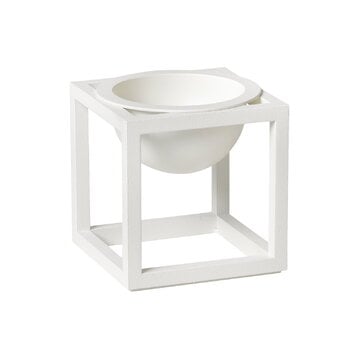Audo Copenhagen's Kubus Mini bowl is perfect for serving salt and pepper or storing small items and little plants. The bowl comes with a food-safe inlay, which can be separated from the frame when needed. The bowl was designed by Søren Lassen based on original drawings from the Danish architect and designer Mogens Lassen. Lassen drew his inspiration from the Bauhaus movement, which is visible in the beautiful, geometric design of the bowl and its cubic steel base.
Kubus bowl, mini, white
Audo Copenhagen
Description
Audo Copenhagen's Kubus Mini bowl is perfect for serving salt and pepper or storing small items and little plants. The bowl comes with a food-safe inlay, which can be separated from the frame when needed. The bowl was designed by Søren Lassen based on original drawings from the Danish architect and designer Mogens Lassen. Lassen drew his inspiration from the Bauhaus movement, which is visible in the beautiful, geometric design of the bowl and its cubic steel base.
Product details (7)
- Material
- Lacquered steel
- Colour
- White
- Length
- 7 cm
- Width
- 7 cm
- Height
- 7 cm
- Weight
- 0.4 kg
- Care instructions
- Wipe with a cloth. Not suitable for dishwasher.
- Product ID
Designer
Søren Lassen has lead by Lassen, the Danish family business founded in 2008, famous for the relaunches of the renowned architect brothers Mogens and Flemming Lassen. Søren Lassen is the grandson of Mogens Lassen, and in addition to running the company, he has also designed products for the brand. The functionalist style of his grandfather has had a major influence on Søren Lassen’s designs, and his products often have a clean-lined and geometric design language.
View all productsReviews (0)
Sustainability
The Product Sustainability Framework, our criteria of sustainable design, helps you find the most sustainable products in our selection. Read below which sustainability criteria this product has met.
Working conditions & labour 7/9
-
Equal opportunities for all employees
-
Commitment to UN Global Compact, fair compensation for all employees
-
Corporate responsibility requirements defined and communicated for suppliers
-
Systematic work for improved inclusion and well-being in the workplace
-
Transparent supply chain
-
Suppliers' compliance to a code of conduct ensured
-
Compliance to the UN Guiding Principles on Business and Human Rights ensured in the supply chain
-
Direct suppliers audited and certified
-
Support for community involvement in the supply chain
Eco-friendly production 8/9
-
Fair and resource-wise water-use in production
-
No incineration or landfilling of returned items
-
No use of endangered species as materials
-
No direct environmental emissions or waste (excl. GHGs) from production
-
The sustainability of direct suppliers' production is addressed and monitored
-
Production and material sourcing that respect biodiversity, animal rights, and natural ecosystems
-
Material-efficient and ecological packaging
-
No potentially harmful chemicals used in own production
-
Positive impact on nature’s well-being through operations that regenerate natural ecosystems
Climate impact 4/8
-
Company's direct greenhouse gas emissions identified and commitment to reduction
-
Product's carbon impact identified and commitment to reduction
-
Guidance on energy- and eco-efficient use of the product
-
Carbon footprint of the product calculated and goals set to reduce it
-
Contribution to climate initiatives beyond the brand’s direct operations
-
Low-carbon or compensated transportation
-
100 % renewable energy in own production and operations
-
Carbon neutral or carbon negative product
Sustainable materials 6/6
-
Sustainable and long-lasting material choices
-
No harmful or hazardous substances
-
Responsible raw material sourcing and production
-
Materials suited for circularity: monomaterials, recyclable finishings, renewable or recycled contents etc.
-
Ecological materials: natural, biodegradable, recyclable or recycled contents
-
Outstanding materials in terms of innovativeness, responsibility, sustainability and circularity: local production or sourcing, 100 % recycled content, C2C-certification etc.
Circular design 4/5
-
High aesthetic quality promoting long-term use of the product
-
Technically durable product design and material choices
-
Design for enduring life-long quality
-
Design and support for product maintenance, repair and upgradability
-
Innovative circular design solutions: circular service system, resale platform, remanufacturing, collection of used products, etc.




